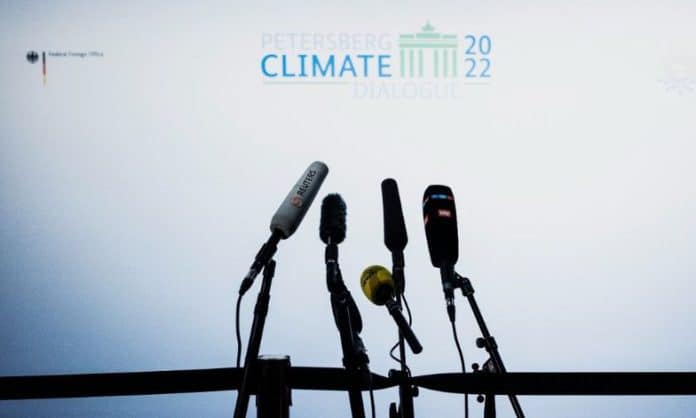The central goal of the Petersberg Climate Dialogue which takes place from 17 to 19 July in Berlin is to strengthen trust both in multilateral climate negotiations and between states. In addition to the largest CO2 emitters such as the US, China and India, heavily affected island states such as the Marshall Islands are also at the negotiating table. In addition to emission reduction and adaptation, the agenda also includes a long-standing demand of many states particularly affected by the climate crisis: Financial support to cope with damage and losses due to climate change.
The meeting of Government representatives from 40 countries serves to discuss major climate protection agreements and focuses on preparations for the COP27 World Climate Conference in Sharm El Sheikh, Egypt (7-18 November 2022).
The prospects of initiating ground-breaking, broadly supported decisions seem bleaker than ever this year, while new heatwaves are affecting the world. The Russian war of aggression on Ukraine and its global repercussions tie up all attention. The Ukraine war shows how closely energy transition and the huge addiction to Russian gas are connected. Now the fight against global warming needs a new plan. This makes it even more important to talk about the future of the planet right now.
Petersberg Climate Dialogue under the sign of global crises
The 13th Petersberg Climate Dialogue is also about reducing dependencies on fossil fuels and supporting poorer countries in switching to sustainable energy sources to limit global warming to 1.5°C degrees. In his video remarks to the Petersberg Dialogue, UN Secretary-General António Guterres warned against slackening ambitions in climate protection: “Greenhouse gas concentrations, sea level rise and ocean heat have broken new records. Half of humanity is in the danger zone from floods, droughts, extreme storms, and wildfires. Yet we continue to feed our fossil fuel addiction”.
Originally, the industrialised countries wanted to give 100 billion US dollars annually by 2020 to finance climate projects in poorer countries of the Global South. But they have missed the target. A total of only 80 billion is expected – the final figures are not yet available. Now, the 100 billion are to come annually by 2023. The recipient countries of the Global South will certainly remind industrialised nations of this at the Petersberg Climate Dialogue.
In his video remarks, UN Secretary-General Guterres called for stronger cooperation: “What troubles me most is that, in facing this global crisis, we are failing to work together as a multilateral community. Nations continue to play the blame game instead of taking responsibility for our collective future. We need to demonstrate at COP27 that a renewables revolution is under way”.

